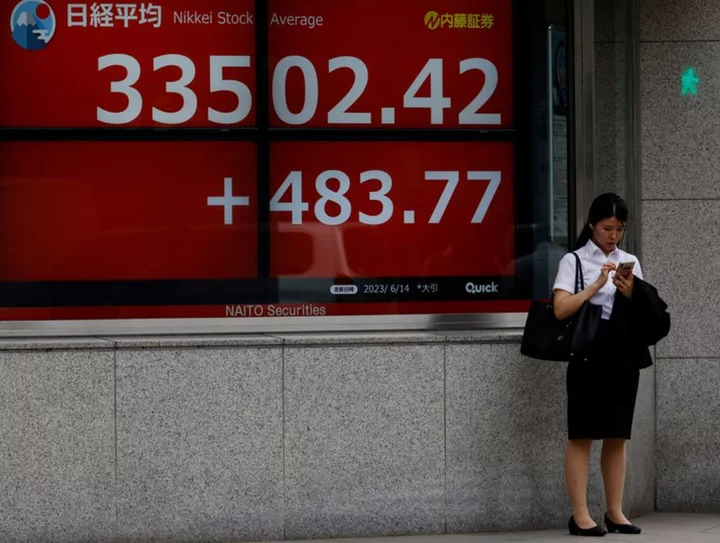The Bank of England raised interest rates by half a percentage point Thursday, after data this week revealed surprisingly stubborn inflation.
The decision in favor of a 13th consecutive hike takes the main borrowing cost for commercial banks in the United Kingdom to 5%, the highest since April 2008.
Financial markets now expect the Bank of England's benchmark interest rate to reach 6% around the turn of the year — a level not seen in two decades — in the ever more desperate battle to control rising prices.
That's bad news for more than 2 million UK mortgage holders, who are bracing for a sharp increase in their monthly mortgage bills when they are forced to refinance this year and next.
"People are very concerned with what is being described as the mortgage bomb about to go off," lawmaker Jake Berry from the ruling Conservatives said Tuesday in parliament, suggesting the government should step in to provide relief for borrowers.
"If we don't help families now, all the other money that we've spent to help them will have been wasted if they lose their home," Berry added.
Higher mortgage rates are likely to dampen consumer spending and raise the chances of a deeper economic slowdown in the United Kingdom, which has so far managed to escape a recession.
The Bank of England had little choice but to hike rates after official data Wednesday showed that UK inflation stayed stuck at 8.7% in May, defying forecasts for a tick-down.
And bucking the trend seen in the United States and Europe, core inflation — which strips out volatile food and energy costs and is a better gauge of the underlying trend in prices — rose last month, hitting a 31-year high of 7.1%. The Bank of England's target for headline inflation is 2%.
A 'historic mortgage crunch'
The worse-than-expected inflation numbers pile pressure on Prime Minister Rishi Sunak, who has promised to halve inflation this year to around 5% as one of his five pledges to voters.
Rising interest rates, which are driving up mortgage payments, are also making Britain's seemingly intractable cost-of-living crisis worse.
The average maturity of UK mortgages is much shorter than in the United States, with two-year and five-year fixes the most common. Many mortgage holders due to refinance their loans this year and next bought their homes when interest rates were much lower and mortgage rates were closer to 1% or 2%.
This week, the cost of the average two-year fixed-rate mortgage rose above 6%, the highest since the start of December, according to financial product comparison website Moneyfacts.
If rates remain at that level, households will spend almost £280 ($357) more on their mortgage each month on average, compared with what they were paying in March 2022, according to the Institute for Fiscal Studies. Those aged 30-39 will pay almost £360 ($459) more.
The number of households feeling that squeeze is only going to grow.
Some 800,000 fixed-rate mortgages are due to expire in the second half of the year, according to UK Finance. Another 1.6 million mortgages will need to be refinanced next year, and at significantly higher rates.
"The latest moves in market interest rates suggest that a dire outlook for UK mortgagors just got worse," Simon Pittaway, senior economist at the Resolution Foundation, a think tank, said in a report.
"If rates move in line with expectations, UK families are set to face a prolonged and historic mortgage crunch."
House prices to fall further
The latest spike in mortgage rates will hit demand for house purchases and, ultimately, house prices.
"So far, the housing market hasn't seen a material change in behavior, although anxiety levels are rising," said Tom Bill, head of UK residential research at real estate agent Knight Frank.
Knight Frank expects house prices across the country to fall 5% this year and another 5% next year.
The housing market will be supported by pay rises — which have in fact become a major driver of UK inflation and therefore interest rates.
"Wage growth is the single biggest aggravating factor for the housing market, but it will also mitigate any decline," Bill told CNN.
Savings accumulated by households during the pandemic and the fact that a large share of homeowners own their dwellings outright are other mitigating factors. Banks are also more likely to exercise restraint and work with borrowers who are struggling to meet repayments.
"I don't think we're going to see a wave of foreclosures and repossessions, which could start to drive prices down more aggressively," Bill said. "There'll be forbearance from the banks."
Only about 30% of UK households have a mortgage, down from 40% in the 1990s, according to Capital Economics, an economic research firm.
There's also been a shift toward loans with terms of 35 or 40 years, rather than 25 years, which has helped limit the drag on buyer demand from higher interest rates, said Andrew Wishart, a senior property economist at the firm.
"Borrowing over a longer period significantly reduces monthly mortgage payments," he wrote in a recent note.
Capital Economics is forecasting a 12% decline in house prices between their August 2022 peak and 2024.
If interest rates must stay higher for longer to tame inflation, house prices could fall more sharply. "If mortgage rates were to stay at 6% for several years, a house price fall of 25% would be likely," Wishart said.
— This is a developing story and will be updated.









